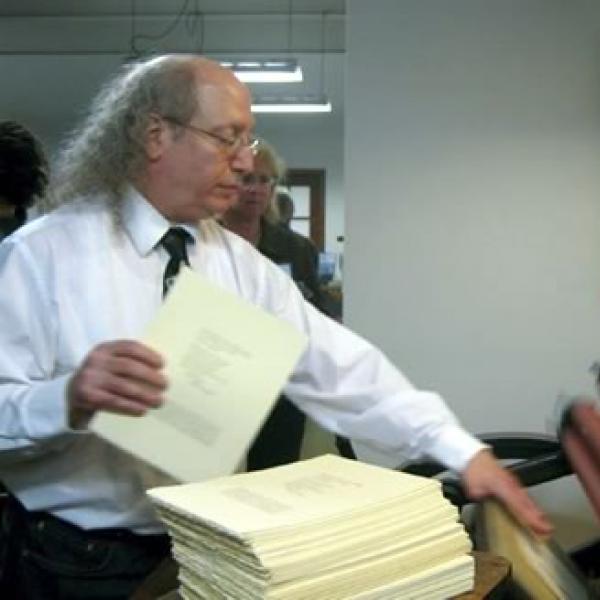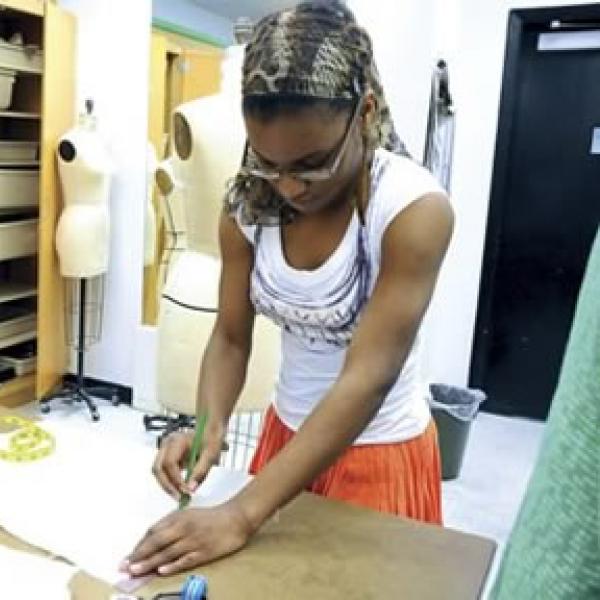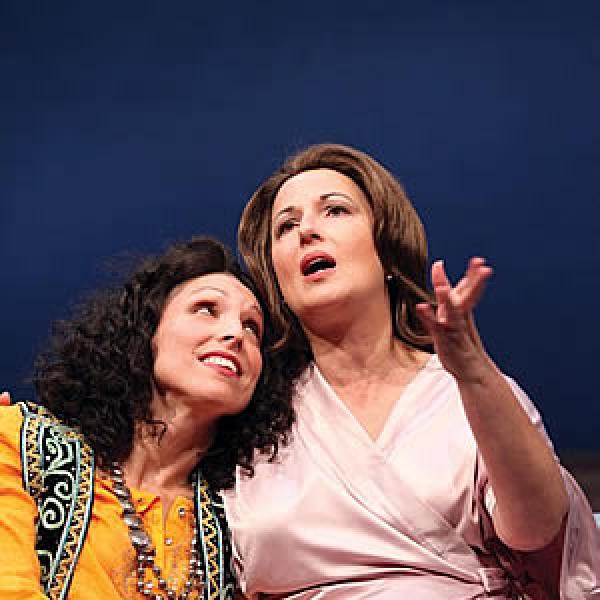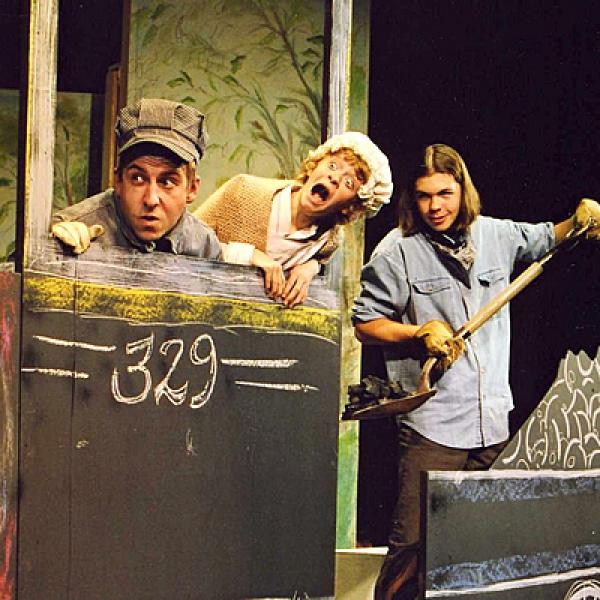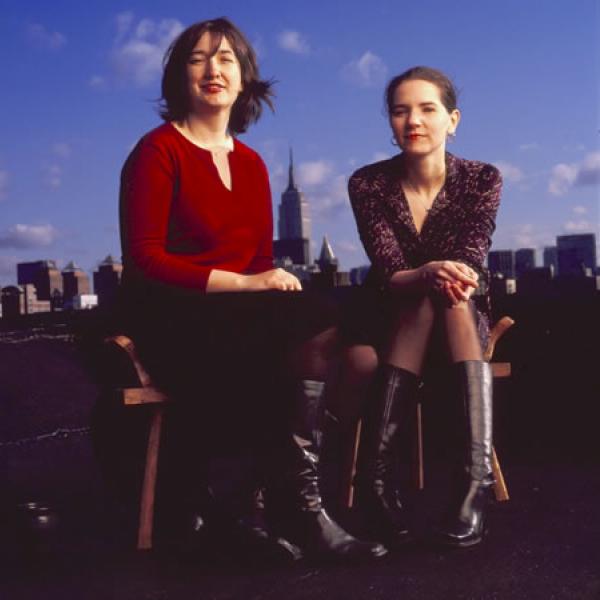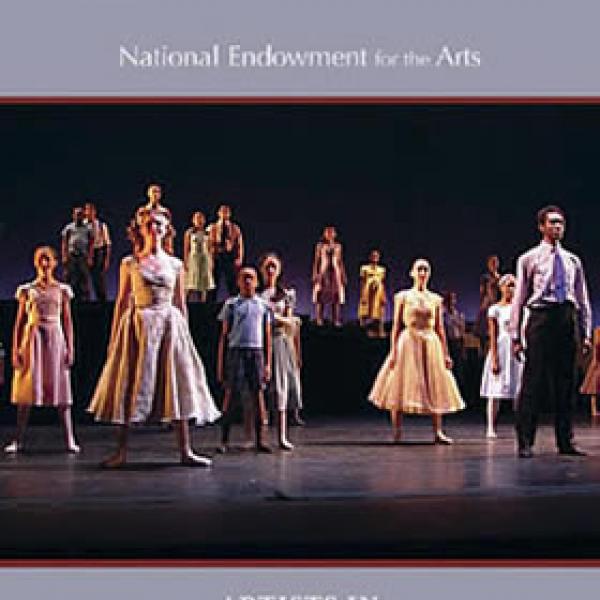Making Art Work
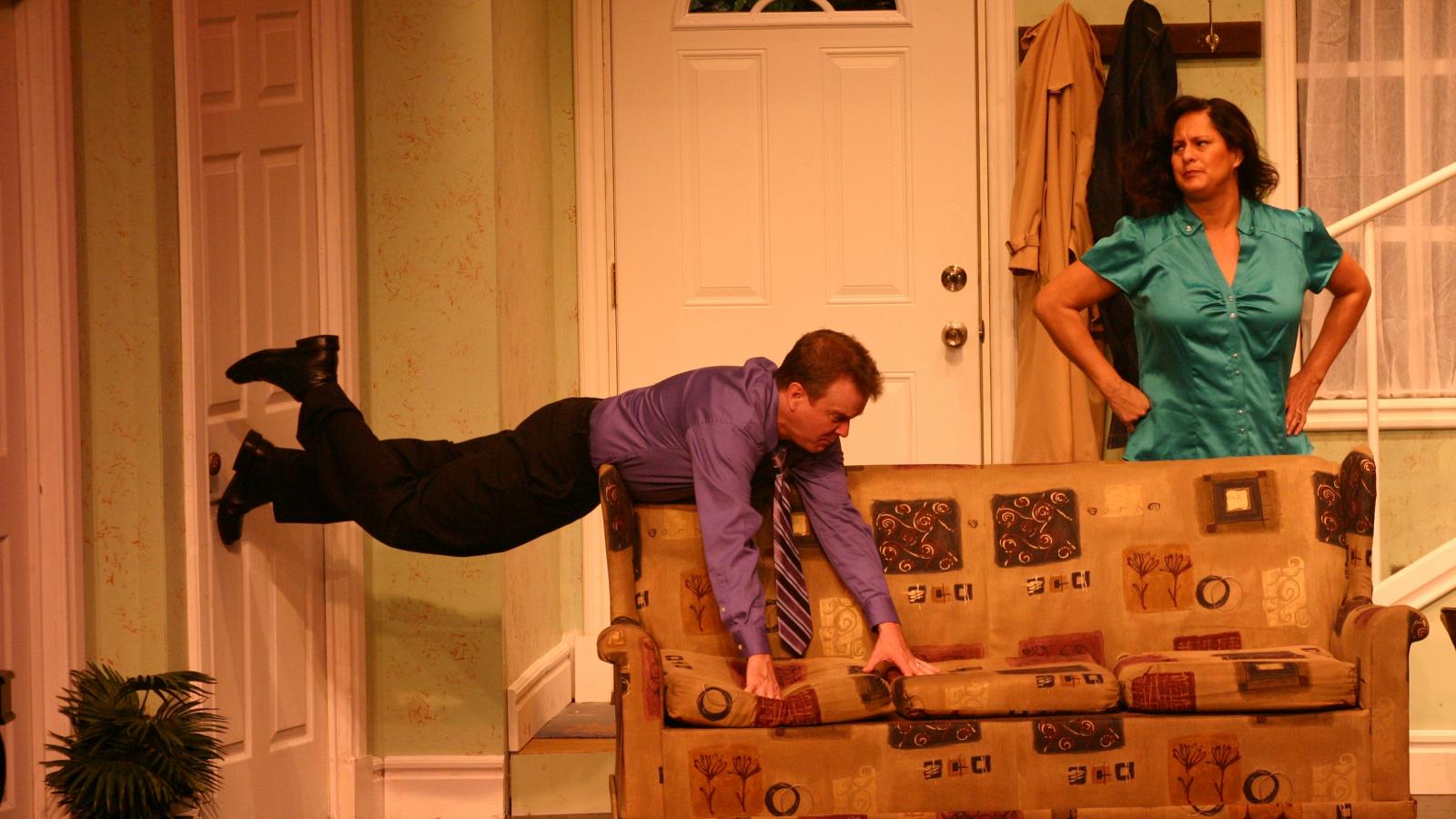
The Market House Theatre of Paducah, Kentucky, produced Tom Dick and Harry, written by Ray and Michael Cooney and directed by Michael Cochran, featuring Al Knudsen and Sabrina Beck. Photo by Michael Cochran
At 12:17 am, Michael Cochran, executive director of the Market House Theatre (MHT), finally had a chance to return e-mails. His workday started at 7:30 am—with prep for an Intro to Theater class he taught for a sick friend at the local community college—and ended after midnight in his office with preparations for a weekend board meeting. In between, Cochran wrote press releases and invitations for auditions, met with local arts leaders about a grant proposal, readjusted lamps in stage lights, led a rehearsal for a children’s performance, fixed the stage’s rotating walls, made a curtain call speech for Neil Simon’s God’s Favorite, gave a PowerPoint presentation, filled in for the director that evening, worked as tech support, and locked up the theater. He also dropped off and picked up his daughter from school.
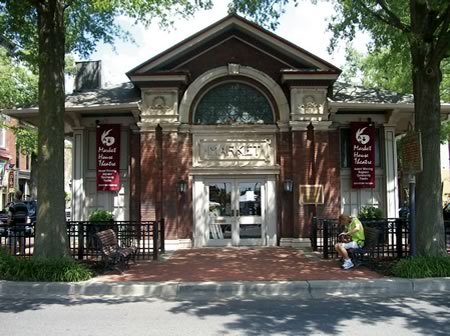
The Market House Theatre is the largest community theater in the state of Kentucky. Photo by Michael Cochran |
That’s a 17-hour day, and while “no day is typical,” long days are not uncommon. Art not only works, art works very hard in Paducah, Kentucky, population 26,307. Still, it’s not uncommon for Cochran to be asked, “What do you guys at Market House do when there isn’t a performance?” The short answer is: fundraise, organize publicity photos, work on ad layout, assist with stage movement and choreography, attend to plumbing and air-conditioning maintenance, review tax laws for contract labor, manage volunteers, work on IT issues, coordinate catering and concessions, and manage hairstyling and makeup—pretty much anything that needs to be done.
Cochran is just one of many arts-minded workers in Paducah. In fact, the week before the board meeting, he was part of a group that left home at four in the morning to drive to the state capital in Frankfort by 8:15 am for Arts Day. It was a long trip for the Paducah delegation, but they had a good story to tell. In greater Paducah, the arts industry is as large as any other employer in the county, as large as Wal-Mart or Harrah’s Casino. “Over 819 jobs are created because of the arts.… It provides over 2.6 million dollars in state revenue and about one million in local revenue. Those returns come from an investment of approximately $150,000 for the total community,” said Cochran.
Market House typifies the importance Paducah places on arts and culture. Started in 1963 as a little theater group, it has become an important regional theater—the largest community theater in the state of Kentucky—providing arts education to tens of thousands of school children and drawing audiences from a four-state region every year. Last year the theater had 38,683 paid participants in programs and more than 3,500 free attendees. Despite losing one full-time employee to budget cuts, MHT continues to present great theater thanks to the work of a small paid staff, hundreds of volunteers, and the support (both gratis and paid) of many local businesses. “We don’t just entertain, we change lives,” Cochran said. To those who don’t share his sentiments on art, he cites a recent study of the greater Paducah metro area by Americans for the Arts. “The arts are not just a fuzzy feeling; it’s jobs. Arts and culture generates over $39 million dollars for our area annually.”
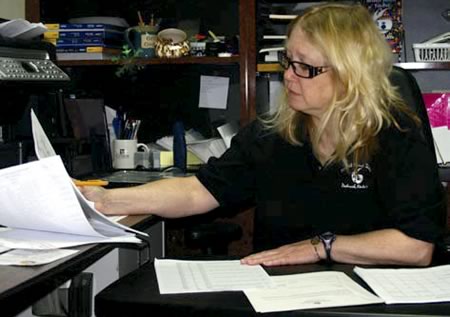
Marsha Cash is the business manager for the Market House Theatre, one of seven paid staff who along with 300 volunteers help to put on 12 to 18 productions a year. Photo by Michael Cochran |
In total, the theater has a paid staff of seven: four full-time and three part-time positions. These arts jobs are real jobs for real people. At the theater, April Cochran, Michael’s wife, serves as education director, overseeing the theater’s Footlights programs for children; traveling performances to schools in western Kentucky, southern Illinois, southeastern Missouri, and western Tennessee; and a theater-in-the-schools program that brings classes to area schools. “About 25 years ago schools began to lose their drama programs due to budget worries and class requirements. We are now one of the main providers of arts education for young people in our region,” said April Cochran.
It’s interesting to note that the theater also employs those who didn’t set out to have a career in the arts. Business Manager Marsha Cash originally came to the theater as a volunteer when her young son Derek was cast as Pooh Bear in Winnie the Pooh. Marsha was looking for a job and enquired at Market House. “I had no idea that people in the arts could use someone with computer skills,” Cash said. She has now been with the theater for 12 years. (Her son Derek served a term as chief of police in their hometown of Clinton. “I think the skills he learned at Market House were a big help to him in dealing with the public,” offered Cash.)
Most people realize that—in addition to actors and directors—theaters need stagehands, technical directors, painters, carpenters, janitors, ushers, and box office workers. What many people don’t realize, however, is the long list of local businesses that make live theater possible. Around town, Paducah Printing, Minuteman Press, Denton’s Garage, Purcell Tire Company, and Hank Brothers Tru Valu Hardware— just to name a few—are all on the list of approximately 30 local vendors used by the theater for an annual investment in the local economy of more than $500,000. Market House depends on neighborhood businesses for everything from vehicle maintenance to lumber for building sets to advertising banners to support for its yearly financial audits.
When asked, business owners seem to agree that not only is Market House a great client to work for, but working for the theater brings them more business. Proprietors Jack and Natlia Hayden of Creatures of Habit rent and fabricate costumes for Market House. Natlia Hayden noted, “Working with MHT opened a lot of doors for our business. After a while I auditioned for a few plays myself and love the feeling of fellowship that you form in theater. The people I meet come back to us.”
Local businesses appreciate that working with the theater impacts more than their bottom lines. Todd Duff, owner of IVS, a Paducah website branding and design company, helps the theater with its Internet presence and also creates promotional posters. While IVS’s work on the website gets some recognition, Duff finds more important the teambuilding that comes from his office banding together to do something wonderful for the theater. “When we work on a project for Market House, we get to the point where we’re not tracking hours…whatever it takes to get it done. That’s good for our team.”
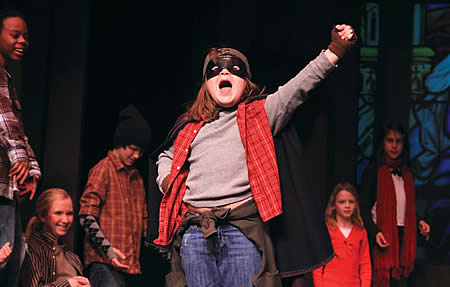
In addition to their regular productions, Market House Theatre also has several arts education programs, including the Footlights youth acting troupes. Photo by Michael Cochran |
People like volunteering for MHT, which is good because the theater has around 300 volunteers per year, enabling it to stretch its budget to put on 12 to 18 productions each season. Just like the full-time staff, the volunteers have a strong work ethic.
While occasionally Market House hires musicians or directors, the actors are all volunteers. Despite their significant day jobs, people like surgical nurse Melanie Koch and chemical engineer Chris Schnarr and sales director Fowler Black all take their art very seriously. Black, for example, was a vocal major in college with hopes of a singing career, but economic realities lead him back home to Paducah. Fortunately his job at the Convention & Visitors Bureau is across the street so that he can walk to rehearsals and then home to his loft on the same block. “When I’m in a play at Market House, I basically live within the radius of one block until it’s over.” Though it is a lot of work, he loves performing with Market House, “Where else would you have the ability to work on a first-rate production and still live in a small town?” asked Black.
“We give people big-city art with a laid-back style of living in Paducah,” said Michael Cochran. All it takes is dozens of local businesses, hundreds of volunteers, a dedicated staff, and a lot of hard work.



